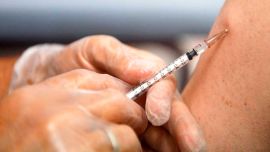It’s difficult to escape the binary logic espoused by those who either love or hate Cristina Fernández de Kirchner. She has been the defining factor of Argentine politics at least since the death of her husband in 2010 and in great part begat the rise to power of Mauricio Macri, who won in 2015 as he morphed into the living image of anti-Kirchnerism. And, of course, she handpicked Alberto Fernández to lead the presidential ticket in 2019. For an important sector of society, Fernández de Kirchner is the personification of evil, a Machiavellian devil whose only purpose in life is to perpetuate herself in power for personal gain. These people marvelled at the sight of a vigorous Diego Luciani, until recently an unknown federal prosecutor, going at her in the courts again and again with an almost sadistic intensity during his accusation against the vice-president for leading an illicit association aimed at defrauding the state in the case known as ‘Vialidad.’ It didn’t really matter that the trial is ongoing, Cristina’s critics immediately congratulated the prosecutor and accepted that the plaintiff is guilty as charged.
There’s another quite numerous group that sees Cristina as the lonely heroine combating the hateful right wingers and neoliberals who’ve eternally destroyed progressive leaders that fight for the oppressed. For them, everything she and her late husband Néstor did is part of the scripture, abruptly interrupted by four years of heresy. They were never returned to their old glory because of the incompetence of President Fernández and the collusion between “The Right” and the Judiciary. For those with stronger faith, the Macrista onslaught is part of a broader plan to destabilise progressive leaders across the region orchestrated by financial interests in the United States that seek to consolidate their usurious plans of subjugating the masses through Wall Street and the International Monetary Fund. No matter how many tons of evidence prosecutor Luciani claims to have, Cristina is innocent and a victim of political persecution, they believe.
What all these people, who make up the majority of the population, fail to see is the broader picture that illustrates what’s really at stake here. As mentioned last week, there is no chance that Fernández de Kirchner will go to prison if found guilty and even if they did, it would be years before the Supreme Court could confirm a guilty ruling. Cristina will probably be a Senator for Buenos Aires Province by then with a mandate until 2029, meaning that she would count on the precious immunity that would have to be stripped from her by the Senate, and, given that she is already older than 70, if that occurred she would be placed under house arrest in her beautiful home in Calafate, close to the world-famous Perito Moreno glacier.
In this week’s hour-and-a-half YouTube response to the prosecution, Cristina put on the type of one-of-a-kind show that only she can deliver in the realm of Argentine politics. She began relaxed, joking about her inexperience with cameras and lighting, and went on a long rant building to a crescendo dominated by an aggressive tone beloved by her followers. Supposedly refuting the “spurious” evidence presented by Luciani and his second in command, Sergio Mola, instead she went on to relay a confusing story that mixed up her husband Néstor and Macri’s former best friend Nicky Caputo, making it unclear whether she was normalising corruption or making an accusation. Her real intention was to try and differentiate herself from José Lopez, formerly her public works secretary, who became famous a few years back when he was found chucking a couple of duffel bags over a convent wall filled with some US$9 million, along with a semi-automatic rifle. López, part of the supposed illicit association that skimmed millions in bribes from constructors involved in public works projects, turned on Cristina, former Planning Minister Julio de Vido and the rest of the gang in the ‘Cuadernos’ corruption notebooks case, turning state witness to denounce the mechanisms by which the “political apparatus” made its cash. López, according to Cristina, had closer communications with Caputo than with Lázaro Báez, her supposed business and criminal associate. Caputo, an important businessman with close ties to Macri — even though they are distanced and he is now a supporter of Horacio Rodríguez Larreta’s presidential claim — is revealed to have had a close and personal relationship with López in a series of text messages displayed by CFK that were introduced as evidence by the prosecution in a late stage of the trial. Why didn’t the prosecutors investigate Caputo, Cristina asked? Because it would prove the Macristas are the corrupt ones, she declared. And this Judiciary would not go against one of their own. Lawfare, as she calls it.
Fernández de Kirchner is playing the long game. She is looking at next year’s elections and has managed to unify all of Peronism behind her cause. And in the meantime the attention has shifted away from the country’s economic woes. Her rant was televised live by all news channels and was followed closely by hundreds of thousands of people. It occurred before her defence team even had a chance to respond to Luciani’s accusations, which were also part of the bread and circus and transmitted across Argentina’s entire media ecosystem. There are questions regarding Luciani’s use of the concept of “illicit association” and the strength of his accusations against CFK, but there should be no doubts that the timing of this trial is no coincidence. It’s funny to see the opposition defend the Judiciary against that Kirchnerite advance, when they quickly denounced it during the heyday of Cristina, and even when it went after Macri and his officials. Argentina’s Judiciary is deeply political and impressively dexterous in shifting the sails to match the winds, whether it’s time to speed up or slow down. As previously mentioned in this column, they are first movers.
Finally, a note on President Fernández’s slip-up regarding the comparison between prosecutors Luciani and Alberto Nisman, the AMIA special investigator found dead in his bathroom a few days after making an accusation against CFK. Pressed by journalists Marcelo Bonelli and Edgardo Alfano in a live TV interview, President Fernández sought to refute the claim that there could be a connection between “what happened to Nisman” and Luciani, and quickly fell stepped on the rake he sought to avoid. “Nisman committed suicide, I hope prosecutor Luciani doesn’t do something like that,” the president ended up saying, provoking the outrage of the opposition that quickly used the statement to accuse him of making a thinly veiled threat. Alberto made a fool of himself not one but twice that night, claiming the judicial investigation into Nisman’s death had shown it was a suicide (something that is still being disputed) and that the historical record shows that Alberto had denied on repeated occasions before joining CFK to lead the Frente de Todos. Pathetic.
Back to the beginning, Cristina is in a tough spot and her judicial situation will likely get worse with time. But she has enough political power to pull through, even though she will suffer from this. Luciani and the Judiciary more broadly knows it has a hot rod in its hands and that the accusations, and final conviction, are far from a done deal. But they know they have the upper hand. Panem et circenses.






















Comments